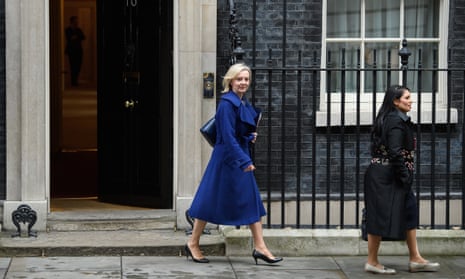Less than a year ago, Boris Johnson told the Democratic Unionist party (DUP) that “no British government could or should” put a customs border in the Irish Sea; he appointed himself minister for the union upon assuming the premiership; Tory hardcore Brexiteers solemnly pledged not to abandon their unionist brethren. Look how casually their erstwhile allies were tossed overboard: the truth is, they never really cared. What they really wanted – and what Boris Johnson’s hard Brexit deal gives them – is a chance to shred workers’ rights and social protections.
This is no conspiracy theory: it is the expressed intention of the Tory politicians championing it. Seven years ago, a group of Tory MPs published a book entitled Britannia Unchained that argued that Britain “rewards laziness”, that British workers were “the worst idlers in the world”, and that “too many people in Britain prefer a lie-in to hard work”. Businesses were deterred from hiring people, they claimed, because of employment laws that made them fear “taking a risk and hiring new staff”. The solution? Repealing those laws – or what should more accurately be described as rights. Three of the book’s authors are now in the cabinet: Priti Patel, Dominic Raab and Liz Truss.
Or consider the defeated Tory leadership candidate Jeremy Hunt, who once championed slashing tax credits for low-paid workers on the grounds that it would make them work as hard as Chinese people. Or, indeed, Johnson himself, who declared that “the weight of employment regulation is now back-breaking”, singling out “the collective redundancies directive, the atypical workers’ directive, the working time directive and a thousand more”.
Some of them championed leave, others campaigned for remain, but all are zealously united behind the new Brexit deal. And no wonder. The prize for these Thatcherite ideologues is the abandonment of a level playing field in workers’ rights and social and environmental protections. That, for them, is what a true Brexit is really about. And if it means the Conservative and Unionist party abandoning the sanctity of the union with Northern Ireland and risking Scottish independence, then so be it. Sure, there were some Tories who felt that Brexit was too disruptive, a distraction, more hassle than it was worth, or who regarded the rightwing populism stirred up by their colleagues as rather too vulgar. But if it can allow a race to the bottom in rights that the Tories regard as burdensome red tape reducing the profits of the businesses who bankroll the party, then so be it.
Those Labour MPs considering voting for the deal should bear all this in mind. If they approve this project of unconstrained disaster capitalism they will betray every value their party was founded to champion, and be remembered for nothing else. If the deal passes – and it could well do so – then Johnson’s chances of triumphing in the coming election will be sharply increased. The new Tory parliamentary intake will be significantly to the right of the current one; with a sizeable majority, it will negotiate a future relationship based on undercutting rights enshrined across the EU. In these years of turmoil, certain rebel Tory MPs have been celebrated as allies of the remain cause: they will now dutifully shuffle through the government lobbies. Where are their principles, you may cry?
“The Tories in England had long imagined that they were enthusiastic about monarchy, the church, and the beauties of the old English constitution, until the day of danger wrung from them the confession that they are enthusiastic only about ground rent.” These words were written by Karl Marx in 1852. As the first stage of the Brexit saga reaches its denouement, they could hardly be more apt.

